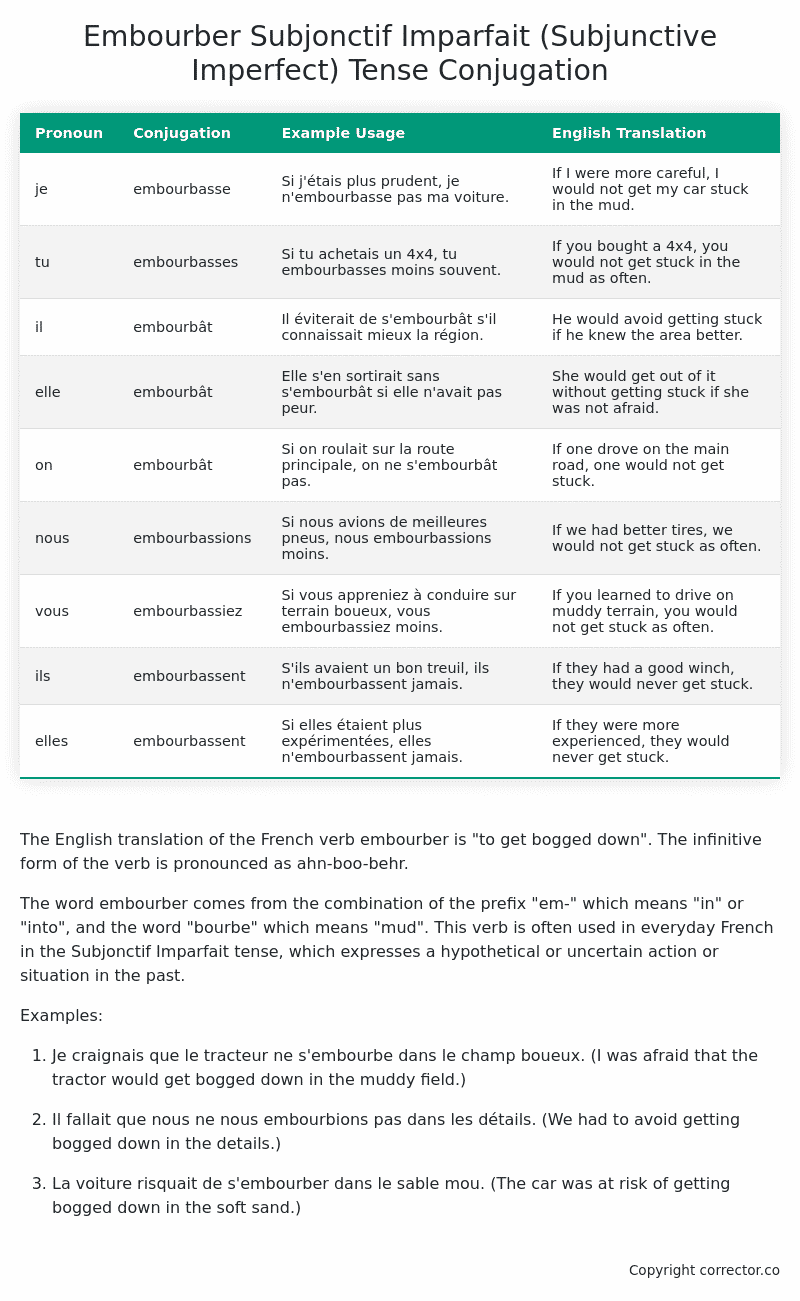Subjonctif Imparfait (Subjunctive Imperfect) Tense Conjugation of the French Verb embourber
Introduction to the verb embourber
The English translation of the French verb embourber is “to get bogged down”. The infinitive form of the verb is pronounced as ahn-boo-behr.
The word embourber comes from the combination of the prefix “em-” which means “in” or “into”, and the word “bourbe” which means “mud”. This verb is often used in everyday French in the Subjonctif Imparfait tense, which expresses a hypothetical or uncertain action or situation in the past.
Examples:
-
Je craignais que le tracteur ne s’embourbe dans le champ boueux. (I was afraid that the tractor would get bogged down in the muddy field.)
-
Il fallait que nous ne nous embourbions pas dans les détails. (We had to avoid getting bogged down in the details.)
-
La voiture risquait de s’embourber dans le sable mou. (The car was at risk of getting bogged down in the soft sand.)
Table of the Subjonctif Imparfait (Subjunctive Imperfect) Tense Conjugation of embourber
| Pronoun | Conjugation | Example Usage | English Translation |
|---|---|---|---|
| je | embourbasse | Si j’étais plus prudent, je n’embourbasse pas ma voiture. | If I were more careful, I would not get my car stuck in the mud. |
| tu | embourbasses | Si tu achetais un 4×4, tu embourbasses moins souvent. | If you bought a 4×4, you would not get stuck in the mud as often. |
| il | embourbât | Il éviterait de s’embourbât s’il connaissait mieux la région. | He would avoid getting stuck if he knew the area better. |
| elle | embourbât | Elle s’en sortirait sans s’embourbât si elle n’avait pas peur. | She would get out of it without getting stuck if she was not afraid. |
| on | embourbât | Si on roulait sur la route principale, on ne s’embourbât pas. | If one drove on the main road, one would not get stuck. |
| nous | embourbassions | Si nous avions de meilleures pneus, nous embourbassions moins. | If we had better tires, we would not get stuck as often. |
| vous | embourbassiez | Si vous appreniez à conduire sur terrain boueux, vous embourbassiez moins. | If you learned to drive on muddy terrain, you would not get stuck as often. |
| ils | embourbassent | S’ils avaient un bon treuil, ils n’embourbassent jamais. | If they had a good winch, they would never get stuck. |
| elles | embourbassent | Si elles étaient plus expérimentées, elles n’embourbassent jamais. | If they were more experienced, they would never get stuck. |
Other Conjugations for Embourber.
Le Present (Present Tense) Conjugation of the French Verb embourber
Imparfait (Imperfect) Tense Conjugation of the French Verb embourber
Passé Simple (Simple Past) Tense Conjugation of the French Verb embourber
Passé Composé (Present Perfect) Tense Conjugation of the French Verb embourber
Futur Simple (Simple Future) Tense Conjugation of the French Verb embourber
Futur Proche (Near Future) Tense Conjugation of the French Verb embourber
Plus-que-parfait (Pluperfect) Tense Conjugation of the French Verb embourber
Passé Antérieur (Past Anterior) Tense Conjugation of the French Verb embourber
Futur Antérieur (Future Anterior) Tense Conjugation of the French Verb embourber
Subjonctif Présent (Subjunctive Present) Tense Conjugation of the French Verb embourber
Subjonctif Passé (Subjunctive Past) Tense Conjugation of the French Verb embourber
Subjonctif Imparfait (Subjunctive Imperfect) Tense Conjugation of the French Verb embourber (this article)
Subjonctif Plus-que-parfait (Subjunctive Pluperfect) Tense Conjugation of the French Verb embourber
Conditionnel Présent (Conditional Present) Tense Conjugation of the French Verb embourber
Conditionnel Passé (Conditional Past) Tense Conjugation of the French Verb embourber
L’impératif Présent (Imperative Present) Tense Conjugation of the French Verb embourber
L’infinitif Présent (Infinitive Present) Tense Conjugation of the French Verb embourber
Struggling with French verbs or the language in general? Why not use our free French Grammar Checker – no registration required!
Get a FREE Download Study Sheet of this Conjugation 🔥
Simply right click the image below, click “save image” and get your free reference for the embourber Subjonctif Imparfait tense conjugation!

Embourber – About the French Subjonctif Imparfait (Subjunctive Imperfect) Tense
Formation
Common Everyday Usage Patterns
Interactions with Other Tenses
Subjonctif Présent
Indicatif Passé Composé
Conditional
Conditional Perfect
Summary
I hope you enjoyed this article on the verb embourber. Still in a learning mood? Check out another TOTALLY random French verb conjugation!


